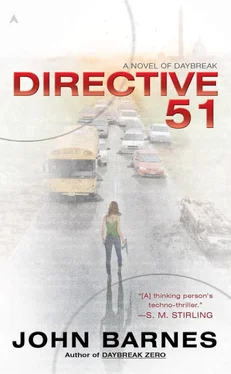“Different beat from mine. I was dealing with the crazy guys that bother pedestrians; mostly the homeless are people and families that are managing in shelters, or relatives’ basements, or cheap hotels. My guys were bums—harder to help but more entertaining, that’s how Stan used to put it.”
She wasn’t crying, and seemed to be all right. Lenny glanced at Heather, then tried, “I didn’t know Stan very well, but we used to visit now and then. He had me teach Dennis some gun safety, because he said there were always guns around and Stan didn’t want Denny to be afraid of them, the way he was.”
Sherry nodded. “That was Stan. Never sure when to be idealistic and when to be practical. I’m going to miss him. I’m glad you guys took me out of there. If there’s a life to come and all that shit, if I’d just stayed there and mourned until someone killed me, Stan’d’ve been so pissed at me.”
“Practical,” Lenny agreed. “We should get rolling.”
They saw children who didn’t seem to have anyone to be with, a young mother with a baby who wouldn’t come close enough to them to talk, and some small groups of armed people who kept their distance.
“Wonder how many of those are out looting and robbing, and how many are preventing it?” Heather said, after a group of three men with pistols and bats had traded waves with them.
“And how many start out to do one and end up doing the other?” Lenny said.
Just after eleven A.M., a biohazard Hummer turned a corner in front of them and came to a stop. A man in a black suit with well-shined shoes got out. “Cameron Nguyen-Peters sent me out to fetch you,” he said. “And to tell you you could at least have tried a pay phone, or flashing Morse code, or something.”
Those last few minutes were surreal; suddenly the trip that should have taken the rest of the day took less than ten minutes. The air was just the right temperature, there was cool clean water for all of them, and on their way along the parkway, shots were fired at them twice.
“That didn’t happen while we were walking,” Heather said.
The driver shrugged. “When you were walking, you looked like people; now you look like the Man.”
ABOUT HALF AN HOUR LATER. PALE BLUFF. ILLINOIS. 10:30 A.M. CST. THURSDAY. OCTOBER 31.
Carol May Kloster wondered if anyone had even thought, yet, about what they’d do for record keeping when they ran out of pencils, since as far as anyone could tell, every single ballpoint pen in Pale Bluff, Illinois, had turned to goo in the last week.
She also wondered if there was really any point in taking down the report from the Food Committee tonight; surely their own records should suffice, without her taking dictation? Especially when George Auvergne had such a knack for going on.
So far the news was that there were enough apples stored, and they probably would not need to commandeer more basements. They were lucky that Pale Bluff had been an orchard town for a hundred years, and luckier still that forty boxcars of just-harvested apples had been waiting on the siding, not yet off to the national market.
According to Linda Beckham, the town’s one dietician, there were calories enough in all those apples, enough vitamin pills had been salvaged from plastic bottles thanks to a smart pharmacist, and the local hunters and fishermen could bring in enough deer, pheasants, and small game with rifles from the local black-powder club for enough protein; they’d make it through without starvation or significant malnutrition. If the winter was cold, ice fishermen could help out, and they were talking to a Hutterite community up the road about trading apples for cheese.
As the only person in town who still knew Gregg shorthand, and therefore could take accurate minutes ( take that, iScribe! she thought), Carol May had job security but she was probably doomed to be the only person who listened all the way through each meeting. She wondered whether what she had done in a previous life had been good or bad.
The Community Kitchen Committee was figuring they could keep everyone fed until June, when early beets and radishes would start coming in. The Planting Committee had located enough seed potatoes and corn. The Poultry Committee reported that there’d be eggs enough around July, and at least some chickens for the table by fall next year. They had a plan for seeing if they could capture and pen wild ducks as well.
The last committee to report was Amusements. Mrs. Martinez pointed out that the candy for the Pale Bluff Community Halloween Party was already on hand, and some children already had costumes; “I was thinking, it’s Halloween tonight, why don’t we just let the kids have a last rampage at the candy? There won’t be any more for a long time, and it wouldn’t be bad to put a little extra fat on the kids for the winter—”
Reverend Walters got up and started yelling about how Halloween and Satan were behind Daybreak. After a moment, Carol May decided to just note down “Reverend Walters objected.” It looked like she’d be eating lunch on the second shift again.
ABOUT 45 MINUTES LATER. ST. ELIZABETH’S FACILITY. WASHINGTON. DC. 2:15 P.M. EST. THURSDAY. OCTOBER 31.
“Mr. Nguyen-Peters,” Mason’s voice said, over the intercom, “the President’s limo is pulling into the driveway.”
Cam’s lips tightened, and he nodded slightly. Heather thought, If I were Cam, I’d be thinking, “There’s about two hundred phones left that work in the whole government, and we have two of them, and Shaunsen can’t call us first?” It seemed of a piece with using the limo; tires survived about a day without peroxide wipedowns, and maybe three days with, yet the Acting President drove everywhere in Washington. He said it was to improve his visibility; to mobs and snipers, I hope.
Well, this is why Cam has his job. With no more than that momentary wince, he stood up, slipped his jacket back on, tightened his tie, and was ready.
Graham Weisbrod looked up and said, “In case we don’t resume soon, are we’re agreed that it’s a priority to get any captured Daybreakers into a secure interview situation with Arnie?”
“Absolutely,” Cameron said. “You’re right that we can’t settle whether Daybreak was a system artifact or a foreign enemy until we can look inside it. Definitely we need to understand Daybreak more than—”
The door flew open. Secret Service and Marine guards moved in, stepping to the side. Then two men in black uniforms with red berets entered, shouting, “Ladies and gentlemen, the President of the United States!”
So these were the National Unity Guard that Shaunsen had put together from young Democratic Party staffers and members of some community groups; nice muscles and tats, but they sure look slobby standing next to Marines and Secret Service, Heather thought. As far as anyone could tell, it was a patronage job; presidential cheerleaders, mostly job-needing sons of important supporters. Somehow he’d found the time to do that in the middle of the country blowing to hell. Now that’s time management.
The National Unity Guards turned to flank the doorway and clapped rhythmically as Shaunsen came in. Well, at least the routine didn’t finish up with “Yay, go Prez!”
Shaunsen all but bounded into the room. “Sorry I didn’t call in advance but I was already down at this end of town, and I just happened to have an idea I wanted to run by you all. I think we need to create a new Cabinet secretary post—the Department of Information.”
The silence among the little group of men and women would have devastated a man who was paying attention.
“I just saw the hatchet job that little shit Manckiewicz did on the exclusive interview I gave him, and it seems to me that with media down to the Advertiser-Gazette , Radio Blue and Gold, and KP-1, what we have here is a near monopoly that needs some administration and regulation. Rusty Parlotta was a whiny, complaining, out-of-control hippie when I was first in Congress, and she hasn’t improved one bit since. And Manckiewicz is a fucking Republican, you can tell it. Now if there’s one thing we depend on in the present emergency, it’s the flow of accurate government information to—”
Читать дальше












